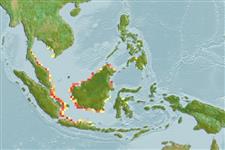Common names from other countries
Пластиножаберные (акулы и скаты) (sharks and rays) >
Myliobatiformes (Stingrays) >
Dasyatidae (Stingrays) > Urogymninae
Etymology: Urogymnus: Greek, oura = tail + Greek, gymnos = naked (Ref. 45335); lobistoma: Name from Latin 'lobus' for elongated projection or protuberance and 'stoma' for mouth, refers to its protrusible, tubelike mouth..
More on authors: Manjaji-Matsumoto & Last.
Environment: milieu / climate zone / depth range / distribution range
экология
морской донно-пелагический. Tropical
Indo-Malay Archipelago: from Sumatra to Borneo.
Size / Вес / Возраст
Maturity: Lm ? range ? - ? cm
Max length : 49.2 cm WD самец/пол неопределен; (Ref. 58327); 100.0 cm WD (female)
Краткое описание
морфология | морфометрия
This species belong to the 'uarnacoides' complex, characterized by the following: lateral disc shape with pectoral fin apices broadly rounded rather than narrowly rounded or angular; color plain (usually uniform light to dark brown dorsally, and pale or whitish ventrally with or without a dark margin; a long and slender whiplike tail and platelike denticles in a broad dorsal band in adults. This species differs from H. hortlei in having a highly protrusible mouth and a pelvic girdle with prominent lateral prepelvic processes (Ref. 58327).
An inshore species which I s probably with restricted distribution in brackish habitats that are associated with runoff from large rivers. Feeds on small fishes and prawns. Males mature at ca. 49 cm WD, females at ca. 70 cm WD; born at ca. 19 cm WD (Ref. 114953). Female maturity based on a pregnant female; males apparently smaller than females; full term pup 18.4 cm DW (Ref. 58327).
Life cycle and mating behavior
половая зрелость | размножение | нерест | икра | Fecundity | личинки
Manjaji-Matsumoto, B.M. and P.R. Last, 2006. Himantura lobistoma, a new whipray (Rajiformes: Dasyatidae) from Borneo, with comments on the status of Dasyatis microphthamus. Ichthyol. Res. 53(3):290-297. (Ref. 58327)
Статус Красного Списка МСОП (Ref. 130435)
CITES (Ref. 128078)
Not Evaluated
Угроза для людей
Harmless
Использование человеком
дополнительная информация
Возраст/РазмерыростЗависимость между длиной и массой телаЗависимость между длинамиРазмерный составморфометрияморфологияличинкидинамика численности личинокпополнениечисленность
ссылкиаквакультура (рыбоводство)особенности рыбоводствастепень растяжениягенетикаElectrophoresesнаследуемостьболезниобработкаMass conversion
соавторыизображенияStamps, Coins Misc.звукиCiguateraскоростьтип плаванияжаберная областьOtolithsмозгзрение
инструменты
Специальные отчеты
Скачать в формате XML
ресурсы в Интернет
Estimates based on models
Preferred temperature (Ref.
115969): 28.2 - 29.1, mean 28.8 (based on 232 cells).
Phylogenetic diversity index (Ref.
82804): PD
50 = 0.5156 [Uniqueness, from 0.5 = low to 2.0 = high].
Bayesian length-weight: a=0.00832 (0.00366 - 0.01891), b=3.10 (2.90 - 3.30), in cm Total Length, based on LWR estimates for this (Sub)family-body shape (Ref.
93245).
Trophic level (Ref.
69278): 3.5 ±0.4 se; based on size and trophs of closest relatives
Fishing Vulnerability (Ref.
59153): Very high vulnerability (90 of 100).
